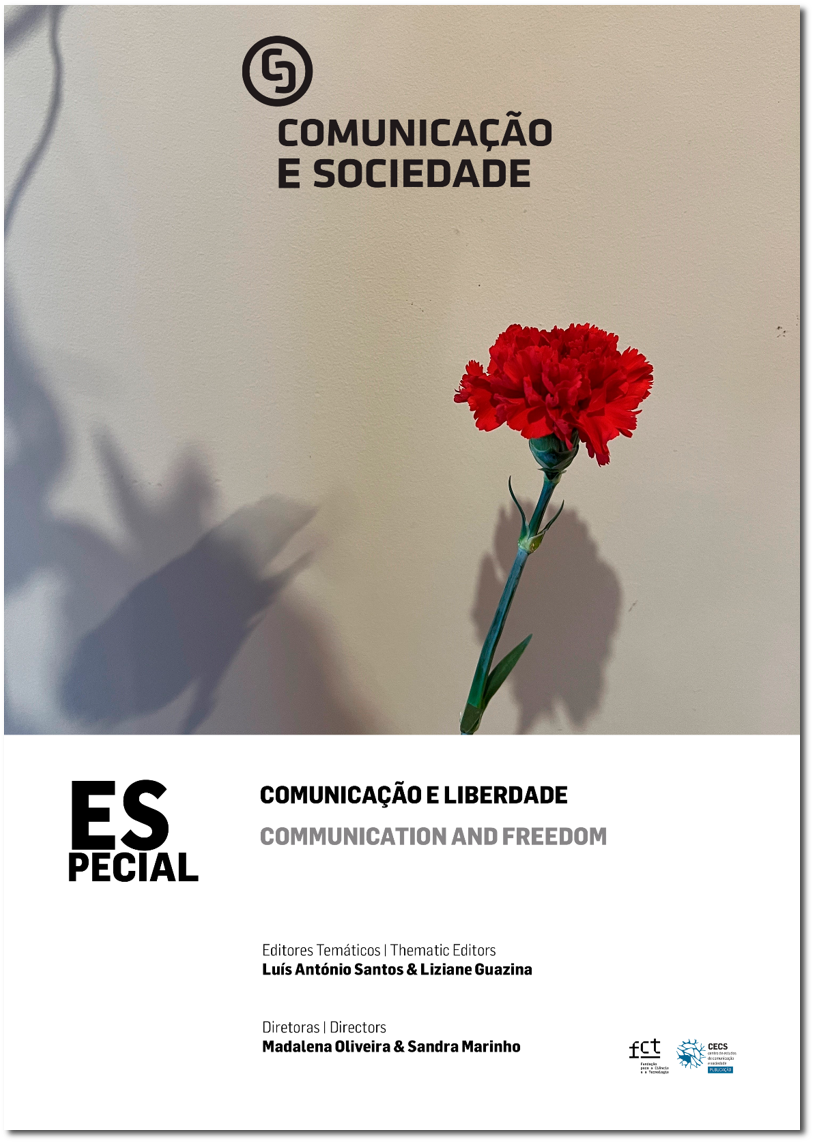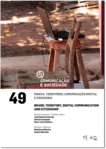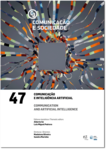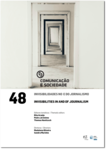“Aprendo Aqui o que Não Aprendo em Mais Lado Nenhum”: Análise de uma Comunidade Online na Área da Saúde
DOI:
https://doi.org/10.17231/volesp(2025).5968Palavras-chave:
comunidade online, participação online, inteligência coletiva, inclusão online, confiança nas redes sociaisResumo
Este artigo procura analisar as dinâmicas que sustentam a comunicação de uma comunidade online na área da saúde focada nos cuidadores, intitulada “Vencer Autismo”, que tinha como epicentro uma página do Facebook e um programa semanal em direto gerido por moderadores. A pesquisa privilegia a abordagem qualitativa: etnografia digital e entrevistas. O trabalho empírico decorreu durante nove meses, de setembro de 2022 a maio de 2023, tendo como fase determinante a etnografia digital realizada durante 10 semanas, a que se seguiram 10 entrevistas. A sucessiva cadeia de relações entre os elementos identificados permitiu descobrir que o conhecimento que ali se adquire é considerado raro pelos seus membros, se sustenta na experiência vivida, notando-se a valorização do aprender a fazer, da prova, a par do discurso irreverente, mas também que o contacto regular beneficia as relações e que o sentimento de inclusão atua como agregador. A confiança, outra das coordenadas estudadas, revela-se volátil — e ocorre num processo em construção — e depende de fatores mínimos, como o facto de os moderadores recusarem pronunciar-se sobre assuntos que não dominam. A transparência surge como o aspeto consensual. O papel dos moderadores é reconhecido e justificado também pela garantia da não civilidade das participações.
Downloads
Referências
Amado, P. M. R. (2014). Participação ativa no desenvolvimento de comunidades online [Tese de doutoramento, Universidade Aveiro].
Bauman, Z. (2000). Liquid modernity. Polity Press.
Benkler, Y. (2006). The wealth of networks: How social production transforms markets and freedom. Yale University Press.
Braun, V., & Clarke, V. (2006). Using thematic analysis in psychology. Qualitative Research in Psychology, 3(2), 77–101.
Bruns, A. (2014). Beyond the producer/consumer divide: Key principles of produsage and opportunities for innovation. In M. A. Peters, T. Besley, & D. Araya (Eds.), The new development paradigm: Education, the knowledge economy and digital futures (pp. 51–65). Peter Lang.
Bruns, A, & Bahnisch, M. (2009). Social media: Tools for user-generated content: Social drivers behind growing consumer participation in user-led content generation. Volume 1 - State of the art. Smart Services CRC Pty.
Burrell, J. (2017). The fieldsite as a network: A strategy for locating ethnographic research. Routledge.
Cardoso, G., Paisana, M., & Pinto-Martinho, A. (2024). Digital news report Portugal 2024. Obercom.
Carpentier, N. (2020). Media and participation. In J. Servaes (Ed.), Handbook of communication for development and social change (pp. 195–216). Springer. https://doi.org/10.1007/978-981-15-2014-3_47
Castells, M. (2002). The internet galaxy: Reflections on the internet, business and society. Oxford University Press.
Couldry, N. (2004). The productive ‘consumer’ and the dispersed ‘citizen’. International Journal of Cultural Studies, 7(1), 21–32. https://doi.org/10.1177/1367877904040602
Ferreira, V. S. (2014). Artes e manhas da entrevista compreensiva. Saúde e Sociedade, 23(3), 979–992. https://doi.org/10.1590/S0104-12902014000300020
Gerashi, M. K., Bakhshnezhad, R., & Nosrati, S. (2023). The effect of information quality and source credibility on information adoption in online communities. New Marketing Research Journal, 12(4), 151–176. https://doi.org/10.22108/nmrj.2023.135304.2777
Gillespie, T. (2014). The relevance of algorithms. In T. Gillespie, P. J. Boczkowski, & K. A. Foot (Eds.), Media technologies: Essays on communication, materiality, and society (pp. 167–193). The MIT Press. https://doi.org/10.7551/mitpress/9042.003.0013
Goffman, E. (1974). Frame analysis. An essay on the organization of experience. Harvard University Press.
Gonçalves, A., Grupillo, A., & Victor Melo, P. (2024). Participação e confiança na comunicação comunitária: Os casos do Vela Notícias e do Jornal da Aldeia. Comunicação e Sociedade, 45, e024004. https://doi.org/10.17231/comsoc.45(2024).4813
Gorbis, M. (2013, 11 de novembro). Revitalizing communities through magic, awe, and inspiration. Stanford Social Innovation Review. https://ssir.org/articles/entry/revitalizing_communities_through_magic_awe_and_inspiration
Guilherme, I. T. (2013). Apoio a doentes e cuidadores em comunidades virtuais de saúde: O caso da comunidade online ELA Portugal [Dissertação de mestrado, Instituto Politécnico de Lisboa].
Hwang, S., & Foote, J. D. (2021). Why do people participate in small online communities? Proceedings of the ACM on Human-Computer Interaction, 5, 1–25. https://doi.org/10.1145/3479606
Kowalski, T., & Jung, B. (2021). Hybrid time as a critical new variable in media consumption – Context of the attention economy. Zeszyty Prasoznawcze, 64(2), 9–21. https://doi.org/10.4467/22996362PZ.21.008.13473
Kozinets, R. V. (2020). Netnography: The essential guide to qualitative social media research. SAGE.
Lévy, P. (2000). Collective intelligence: Man’s emerging world in cyberspace. Perseus.
Liu, X., Min, Q., Wu, D., & Liu, Z. (2020). How does social network diversity affect users’ lurking intention toward social network services? A role perspective. Information & Management, 57(7), 1–16. https://doi.org/10.1016/j.im.2019.103258
Lovatt, M., Bath, P. A., & Ellis, J. (2017). Development of trust in an online breast cancer forum: A qualitative study. Journal of Medical Internet Research, 19(5), e175. https://doi.org/10.2196/jmir.7471
Lupton, D. (2016). The use and value of digital media for information about pregnancy and early motherhood: A focus group study. BMC Pregnancy and Childbirth, 16, 1–10. https://doi.org/10.1186/s12884-016-0971-3
Malone, T. W., & Bernstein, M. (2022). Handbook of collective intelligence. Mitpress.
Mander, J., & Koch, J. (2020). The era of we. Globalwebindex; Reddit.
Matos-Silva, M. S., Abreu, R. A. S., & Nicolaci-da-Costa, A. M. (2012). Como satisfazer nossas necessidades de interagir online em diferentes níveis de intimidade? Um estudo sobre a comunicação nas comunidades virtuais. Interações em Psicologia, 16(2), 217–226. https://doi.org/10.5380/psi.v16i2.24662
Merleau-Ponty, M. (1976). Phénoménologie de la perception. Gallimard.
Myllylahti, M. (2019). Paying attention to attention: A conceptual framework for studying news reader revenue models related to platforms. Digital Journalism, 8(5), 567–575. https://doi.org/10.1080/21670811.2019.1691926
Pestana, S. (2010). Saúde web 2.0 – O papel das comunidades virtuais de doentes na área da saúde: Um estudo de caso para Portugal [Dissertação de mestrado, Universidade Nova de Lisboa].
Pink, S., Horst, H., Lewis, T., Hjorth, L., & Postill, J. (2015). Digital ethnography: Principles and practice. SAGE.
Preece, J. (2001). Online communities: Usability, sociability, theory and methods. In R. Earnshaw, R. Guedi, A. van Dam, & T. Vince (Eds.), Frontiers of human-centered computing, online communities and virtual environments (pp. 263–277). Springer.
Rheingold, H. (1993). The virtual community: Finding connection in a computerized world. Addison-Wesley Longman Publishing.
Ridings, C. M., & Gefen, D. (2004). Virtual community attraction: Why people hang out online. Journal of Computer-Mediated Communication, 10(1), Artigo JCMC10110. https://doi.org/10.1111/j.1083-6101.2004.tb00229.x
Ridings, C. M., Gefen, D., & Arinze, B. (2002). Some antecedents and effects of trust on virtual communities. The Journal of Strategic Information Systems, 11(3–4), 271–295. https://doi.org/10.1016/S0963-8687(02)00021-5
Rokka, J., & Moisander, J. (2009). Environmental dialogue in online communities: Negotiating ecological citizenship among global travellers. International Journal of Consumer Studies, 33(2), 199–205. https://doi.org/10.1111/j.1470-6431.2009.00759.x
Surowiecki, J. (2014, 18 de maio). The collective intelligence of the web. The New Yorker. https://www.newyorker.com/tech/annals-of-technology/the-collective-intelligence-of-the-web
Tapscott, D., & Williams, A. D. (2006). Wikinomics: How mass collaboration changes everything. Portfolio.
Toffler, A. (1980). The third wave. William Morrow.
Vilches, M., García, S., & Román, J. (2023). La producción de discursos sociales en entornos digitales: La comunidad digital como metodología de investigación social. Teknokultura, Revista de Cultura Digital y Movimientos Sociales, 20(2), 183–194. https://doi.org/10.5209/tekn.83473
Weld, G., Zhang, A. X., & Althoff, T. (2024). Making online communities ‘Better’: A taxonomy of community values on Reddit. Proceedings of the International AAAI Conference on Web and Social Media, 18(1), 1611–1633. https://doi.org/10.1609/icwsm.v18i1.31413
Wenger, E (1998). Communities of practice: Language, learning, and meaning. Cambridge University Press.
Xie, J., He, Z., Burnett, G., & Cheng, Y. (2021). How do mothers exchange parenting-related information in online communities? A meta-synthesis. Computers in Human Behavior, 115, 1–10. https://doi.org/10.1016/j.chb.2020.106631
Zaslow, E. (2012). Revalorizing feminine ways of knowing: The challenge to biomedical epistemology in an online mothers’ health communities. Information, Communication & Society, 15(9), 1352–1372. https://doi.org/10.1080/1369118X.2011.638653
Zhao, Y., Zhang, L., Zeng, C., Chen, Y., Lu, W., & Song, N. (2024). Factors influencing online health information credibility: A meta-analysis. Aslib Journal of Information Management. Publicação online antecipada. https://doi.org/10.1108/AJIM-05-2023-0155
Downloads
Publicado
Como Citar
Edição
Secção
Licença
Direitos de Autor (c) 2025 Aldina Margato, Jorge Vieira

Este trabalho encontra-se publicado com a Licença Internacional Creative Commons Atribuição 4.0.
Os autores são titulares dos direitos de autor, concedendo à revista o direito de primeira publicação. O trabalho é licenciado com uma Licença Creative Commons - Atribuição 4.0 Internacional.











